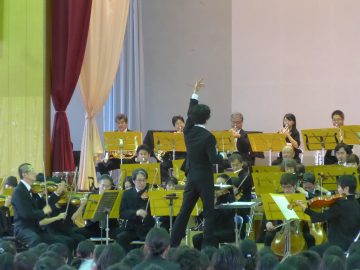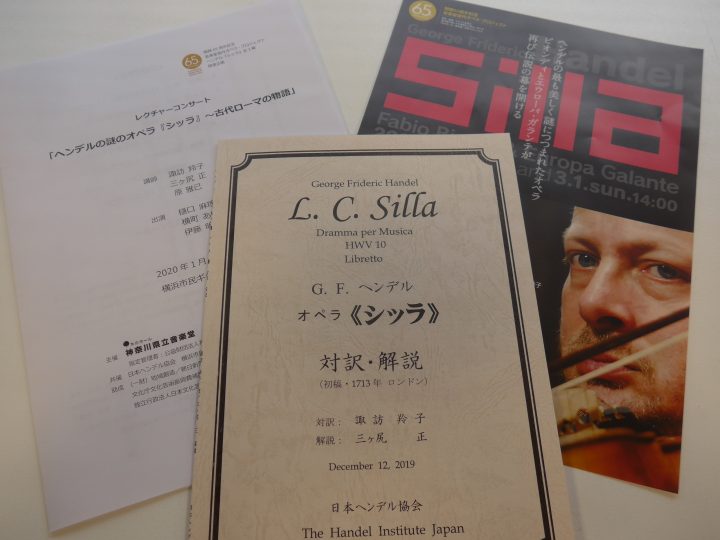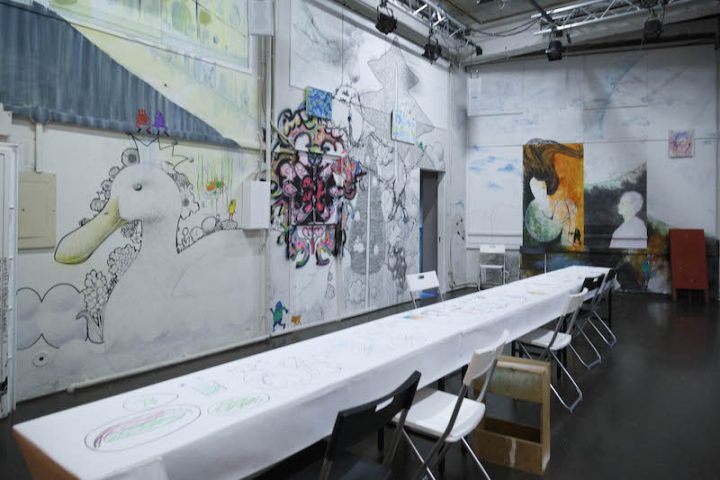Kanagawa・Standing Bar Culture Talk Vol.4 "Language and Magic"
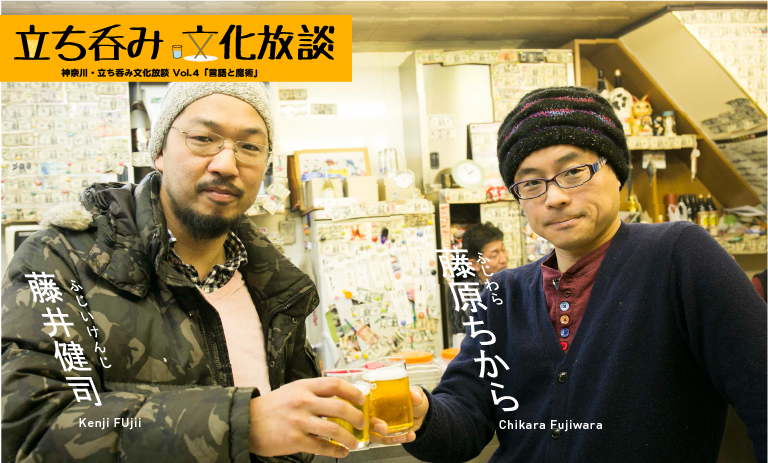
2015.2.6 Text: Akiko Inoue Photo: Masamasa Nishino
Chikara FUJIWARA
Editor, critic, and founder of BricolaQ. Born in Kochi City in 1977. Moved to Tokyo at the age of 12 and began living alone there. Moved around a lot after that, worked for a publishing company before going freelance. Edited Musashino Art University's newsletter "mauleaf" and Setagaya Public Theater's "CaroMag". Co-edited with Tsujimoto Chikara "Book Guide to Architecture" (Meigetsudo Shoten). Co-authored with Tokunaga Kyoko "The Strongest Engeki Theory" (Asuka Shinsha). Currently lives in Yokohama. Member of Theatre Center F. Also creates "Engeki Quests" in various locations, where participants stroll around cities and peninsulas with gamebooks in hand.
Kenji FUJII
Born in Tokyo in 1981 and raised in Yokohama.
The day of the interview was a cold, rainy day, with the possibility of snow in the forecast. Hideyoshi Shoten, a 27-year-old bar in Yokosuka, Kanagawa Prefecture, was started by the father of the first manager together with his younger brother. Yokosuka has many foreign customers, and chuhai has become a bit of a status symbol, but Hideyoshi Shoten is the most famous chuhai stand in Yokosuka, which is a purveyor to the Navy. This is the fourth installment of the series, and we welcomed Japanese painter and artist Fujii Kenji to this worldwide bar for a chat on the theme of "language and magic."
Fujii: Actually, this was my first time coming to Yokosuka to drink.
Fujiwara: If you take the Keikyu line, Yokosuka is pretty close. I come here about once a week to drink, and I've been to this restaurant a few times.
(Looking at the counter) Oh, they also have oden. Is it only available in winter?
Manager: That's right. Should I just pick out about five?

Winter limited edition handmade oden
Fujii: Radishes are good, for example.
Fujiwara: Then let's do it while snacking.
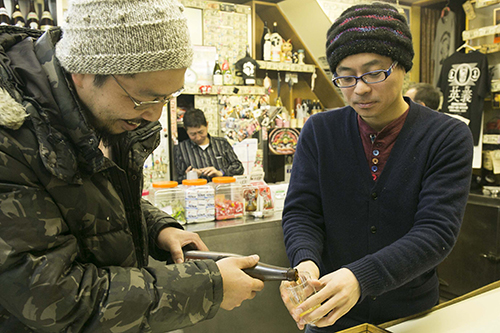
Let's pour each other beer...cheers!
Fujii: There are a lot of dollar bills on the walls and ceiling...

Staff: It's bad weather today so there aren't many people here, but there are usually a few foreigners here during the day. It seems to be full of them at night. It was also introduced in the US military media as "If you come to Japan, go here!"
Fujiwara: What? A US military site?
Dad: People from the Midway used to come here to drink, and it was featured in the ship's newspaper as a place where they didn't cheat and you could get drunk cheaply, so it was a good place to go. Then, the bar was full, and there were 70 to 80 people outside, so cars couldn't get through, and it was really tough.
*Midway: A US Navy aircraft carrier. It was stationed in Yokosuka Port from 1972 to 1991.
Manager: Even now, we have a lot of foreigners who come in almost every day. I know the regulars from the U.S. military who come in with their subordinates, watch us pouring shochu and other drinks like this, and say, "See, it's only 390 yen for all that. How much do you think it costs at other places?" (laughs) In this way, customers form connections with each other and bring in new customers.
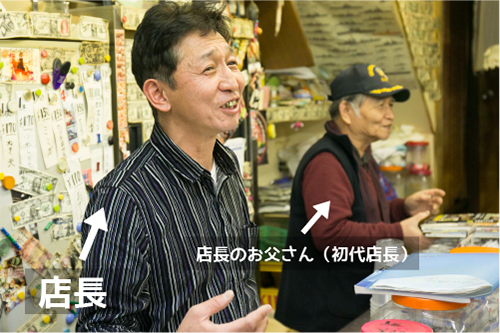
Manager: We are in Japan and have our own homes, but they are stuck on a ship like that and can only go back home a few times a year. I think they must be nervous at times. When the ship returns, some of them come straight to our store saying, "We're back!" I think that while they are in Japan, this is like a home for them.
Fujii: Did you start putting up these dollar bills after foreigners started coming?
Manager: Yes. Everyone puts them up to leave a trace that they've been to the store.
I'm thinking of donating this to UNICEF in the future so they can buy vaccines. I'd like to have Tetsuko Kuroyanagi come and collect it at the end (laughs).
Fujiwara: That's great. I'd love to see Tetsuko's Room here.
Everyone: Rururu, Rururu
Now that we've heard the familiar opening song, let's get to the main topic.
But before that, we had a lively discussion about local things.
It turns out that the store manager and Fujii attended the same elementary and junior high school!
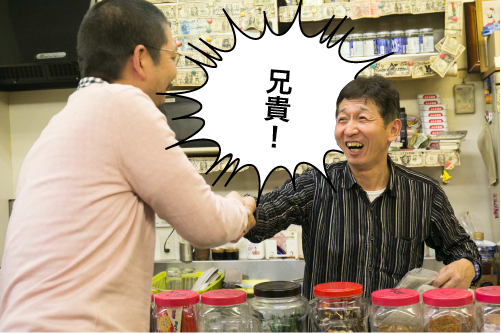
Shaking hands with a senior who is 17 years younger than me!
What image comes to mind when you hear "Short HOPE"?
Fujii: Would you like to try the big cutlet?
Manager: It's not that tasty (laughs).
Fujii: No, I like it... for some reason (blushes)
Manager: Two for 140 yen.
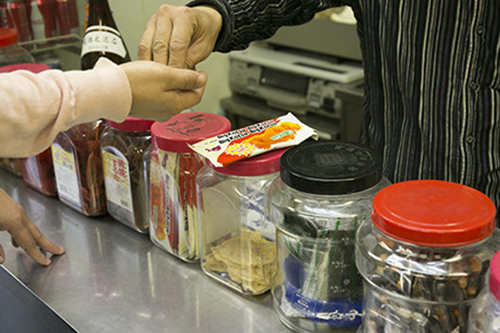
From the wide selection of snacks and sweets lined up, I chose my favorite, Big Cutlet!
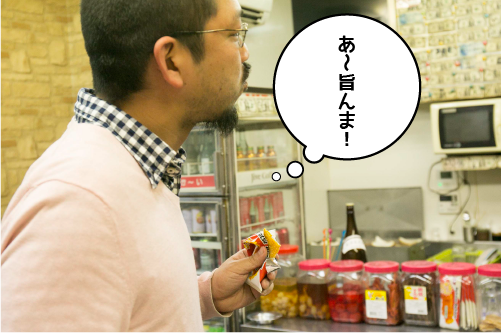
And eat a big cutlet
Before you know it, the number of foreign customers starts to increase.
A British customer who can speak Japanese spotted the recorder and seemed to be intrigued...
British customer: Newspaper? Ah! Amazing!
Fujiwara: It's a website called MAGCUL.NET. Sorry for the trouble (laughs).
British customer: No, there are so many foreigners around, it's fine. Don't worry Don't worry. It's fine now.
At this point, Fujii-san suddenly picked up a cigarette that was in front of him...
Fujii: SHORT HOPE!
British customer: I hope it tast good!
Everyone: lol
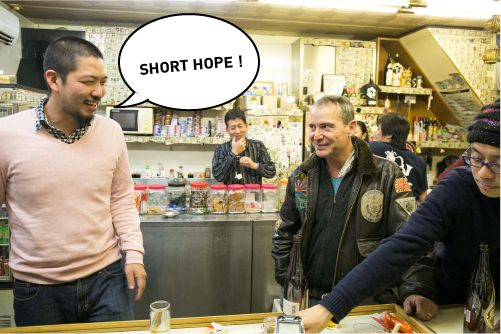
Fujii: My Canadian friend who is a performer, somehow he likes the concept “Short Hope”, and it is also “Light”. (My Canadian friend who is a performer saw “Short Hope” and somehow he liked it. For Japanese people, it is a product name, but for him it means “short hope”, so he thought the concept was really interesting. And it is also light (lol))
Fujiwara: That's true. If you look at it simply, he's a short-term hope.
Fujii: "A short-lived hope, and a light one at that"... (laughs)
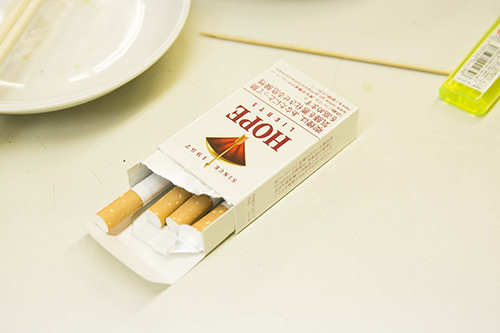
Fujiwara: I think it's ironic.
Fujii: Short Peace is outrageous.
Fujiwara: Not at all! Seriously, really... But the fact that a word can sound different depending on the context is related to today's theme.
Manager: How about some Japanese sake, you two? Hot sake, Ozeki, with some pufferfish bones. If you don't mind the smell of fish, I'll serve it for free.
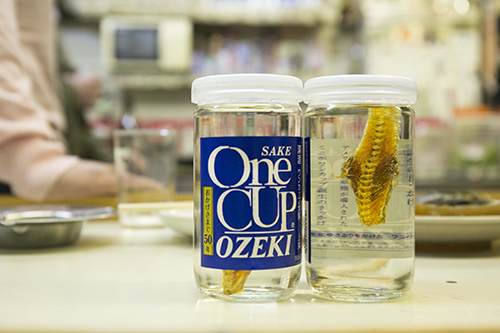
The bones of a fugu fish are roasted and put into hot sake called Ozeki. The unique aroma and flavor make the usual Ozeki sake incredibly delicious!
(By the way, this is only available when there are bones.)
Manager: Leave it for about 30 seconds to a minute. Then the color will change. It will probably no longer taste like Ozeki.
Fujiwara: Wow, this is a more powerful version of fin sake! Let's eat!
Manager: How is it?
Fujiwara: Ah, this is great.
Fujii: This is delicious and fragrant.
Manager: I thought so (laughs). Everyone who drinks alcohol says it's delicious.
It has a stronger flavor than the fillet. This is being sold at the regular price of Ozeki.
Fujiwara: Wow, this is great.
Fujii: Um...by the way, where is the restroom?
Manager: Ah, for men, there is a public toilet at Shioiri Station.
So the two of us went to the bathroom. (Rattle, the sound of the sliding door opening)
Fujii: It's not snowing yet.
Fujiwara: Eh, is it snowing today?

The public toilet in front of Shioiri Station is 1 minute away from the shop (women's toilets are located inside the shop)
Now that I've returned from the bathroom, let's move on to the next topic.
What makes language possible?
Fujiwara: I understand that you travel between Canada and Japan. In that case, I think it becomes the default that the "place" and "language" you are in now are not unique and absolute. But when you live in Japan, you tend to trust too much in the premise that you can communicate. When I think about it again, I feel that it's dangerous that a large part of modern Japanese society is made up of common sense, customary behavior, and physicality that are cultivated under that premise.
Fujii: That's right. On the contrary, laughter can be generated by betraying that common sense through words.
Fujiwara: Yes. I think that can be true for laughter and theater. I'm going to expand a little, but when we talk about "language," we don't just mean Japanese or English, but there can also be circuits such as the "language of painting," the "language of music," and the "language of film." I think that humans have a wide range of perceptions and communication in the course of their lives. But now, I often feel that things are being simplified to something like "ease of understanding," and that this is gradually destroying possibilities. At a time like that, I saw Fujii's work, which was filled with writing (drawing?) in his notebook, and I thought, "What is this guy doing?!" (laughs). I chose "magic" as today's theme because I was inspired by this work...

This is a piece that Fujii has been working on in recent years. It is created through the act of copying the shapes of language (letters).
Fujii: It's beautiful, isn't it? I like writing and drawing, not just letters. I've mainly shown you Japanese and English works, but recently I've also been working on languages I don't know at all.
Fujiwara: Among the works you showed me there was seal script and another language that I couldn't read.
Fujii: That's Timshwan, a language spoken by an indigenous Canadian. Writing characters that you can't read is just the act of "writing" because you can't understand the meaning. What I've learned from doing that is that without conventions, characters don't exist as characters. So I think words themselves don't have meaning. Words only have meaning when there is a society.
Fujiwara: Did you like copying things?
Fujii: I like it. When I was in kindergarten, I used to copy Tibetan mandalas. For example, no matter how ridiculous the text may be, when you don't understand the meaning and just take it in based on its appearance, I think there are times when you are moved by its appearance.
Fujiwara: Before I even consider the meaning of the characters, I like their shapes. Recently, I've been writing sentences, but I haven't been writing letters, which is what I felt when I saw Fujii's work.
Fujii: Letters have meaning, don't they? But when you just follow the shape, there comes a point where the meaning leaves you. How can I explain it... I'm not sure if it's a unique "world" or a "center of gravity", but my brush starts to feel heavy. I like that sense of unity with the letters. When I draw beautiful lines, it's when I'm immersed in it, and I change the channel a little.
Fujiwara: Like it will sit better...?
Fujii: That's right. It brings me an indescribable sense of relief. It's more of an exercise than a meaning. But what really bothers me is the dilemma between immersing myself in the sensation because I like it, and presenting it to others as an expression.
Fujiwara: I see. How do you resolve that dilemma?
Fujii: In my case, I want to immerse myself in the experience and pursue that feeling of pleasure to the fullest.
Sending words far away = going beyond context
Fujiwara: I would also like to ask about Etegami, which was exhibited at the Yokohama Museum of Art's Japan/Art Exhibition. In the exhibition statement, the curator, Kashiwagi Tomoo, quoted Natsume Soseki's criticism of the Bunten Exhibition , saying that "no matter which exhibition you look at, it's flat." According to Kashiwagi's interpretation, Japanese painting is "the standardization of the original painting techniques and schools rooted in various regions" while incorporating Western culture during the Meiji Restoration. So Etegami, which you created in Amami, was invited to an exhibition that raised questions about the very concept of "Japanese painting."
*Japan/Art Exhibition A special exhibition held at the Yokohama Museum of Art in 2006. In addition to Fujii, other exhibitors included Matsui Fuyuko, Shiriagari Kotobuki, Nakamura Kengo, Osemura Mami, and Nakagami Kiyoshi.
*Bunten = Ministry of Education Art Exhibition/predecessor to the current Nitten Exhibition

"Illustrated Letter" (detail)
Fujii: The "Illustrated Letters" series is still ongoing. At the time, I sent them to myself at home, and now I send them to a friend in Canada.
Fujiwara: Ah, so letters do have the function of "transmitting distances." That also means they transcend the context of a particular place...
Fujii: What's more, there's a rule that the Illustrated Letters must never be opened, so no one can read the words inside.
Fujiwara: What?! The person who received it can't even read it?
Fujii: Yes, that's the only rule.
Of course, you can see the front of the envelope, which is a drawing of my experience at that time, but the words inside are not shown. In terms of the exhibition, it shows that they are not shown. I myself hardly remember what I wrote. There are already more than 1,000 pages.
Fujiwara: If you take the trouble to write a letter, I think you probably want the recipient to read it, no matter how big or small it is...
Fujii: At that time, I was having a really hard time and managed to go to Amami for just over 100 yen.
Fujiwara: 100 yen...
Fujii: I went to Amami, but I only had a little over 100 yen with me.
Fujiwara: ...Anyway, I can't go home...
Fujii: I couldn't go home. I arrived, but I was in a situation where I had to decide whether to eat something or buy cigarettes. At that time, cigarettes were about 130 yen at Short PEACE, so I was just about able to buy them.
Fujiwara: That's amazing... It's truly Short PEACE... Very Short PEACE.
Fujii: That's right (laughs)
In the end, I ended up working as a live-in employee at a tsumugi craftsman's house, through a connection made by an old lady I met on the beach where I happened to be sleeping rough. That's when I came up with the idea of "picture letters" as a way to show my parents, who were far away, that I was doing well and making art properly. But I didn't think I needed to communicate in words. There are just some things I want to put into words. It's so much easier to write them if you don't think anyone will ever read them. It's okay to make typos and there's no need to act. I was tired of acting at the time, so maybe I wanted to be liberated from that.
Fujiwara: That makes a lot of sense to me now. You imposed a rule on yourself. Now, nine years have passed since the exhibition at Yokohama Museum of Art, but I think those sealed words are still important, and maybe even more important now.
Fujii: Yes. Since the Act on the Protection of Specially Designated Secrets came into force, I feel like I have come across perspectives that are different from what I had initially expected.
Fujiwara: Nowadays, most things, including the Internet, can be censored.
But "picture letters" are strange. There is an addressee, but do you really want to convey something? Nowadays, we tend to speak to an unspecified number of people, but it's like throwing words into a swamp, somehow. On the other hand, Fujii's "picture letters" addressed to his family and partner may not be readable, but at least the picture has reached the recipient.
Fujii: On the other hand, maybe the picture on the surface is more real. Words are very specific, but pictures are more vague and may say more than the words. I think that's how eloquent the work is. In fact, in Saussure's last lecture, he just spoke, he didn't put it into words himself. I wonder if visual images are more like parole * that includes facial expressions... It's complicated.
*Parole: A term used in linguistics and philosophy. Its meaning varies depending on the context, but here it generally refers to "spoken language" as opposed to "written language." It has the characteristic of being more personal. Incidentally, written language is called écriture, and has the characteristic of being more social.
Fujiwara: There is a traditional dichotomy between parole (spoken language) and écriture (written language). I'm just a writer, so I tend to lean toward écriture, but after I became deeply involved in theater, I realized that, for example, "plays" are a kind of going back and forth between parole and écriture. Also, I feel that as the internet became filled with text, imitation of écriture progressed too quickly. Crude imitation of fixed forms became too advanced. In other words, it becomes a degraded copy by re-enacting someone's écriture that already exists. I feel that I myself have not escaped the influence of this imitation. I think that when modern thought was talking about écriture, the act of publishing and reading words itself had authority, and that's why écriture had the power to shine.
Fujii: But if we go back to ancient Greece, the performers had more power. In other words, parole was superior to écriture.
Fujiwara: That may be true. If you think about it, the period when ecriture was dominant may have been surprisingly short. However, from the perspective of records = archives, I think ecriture is also important. There was also the problem that many video works could no longer be viewed after the switch from VHS to DVD.
Fujii: Yes. But that doesn't mean that murals will remain forever. One thing I can say is that they will be "passed down." Even if the situation changes and society changes to one where the previous context is no longer valid, even if the form is no longer visible in the process of people who see something and refer to it, I don't think it can necessarily be said that it has disappeared. Such activities are like a game of telephone, so it is natural that there will be misreadings during the process of passing on, and I think that they will remain by changing the way of expression in a way that naturally fits society, including that.

Which comes first, the name or the reality?
Fujiwara: By the way, Mr. Fujii has changed his name from "Fujii Rai" back to his real name, "Fujii Kenji."
Names are mysterious things, and while some people treasure them, others find them hard to accept. However, in Japan, names are given first and last names, but in China, people have nicknames * , and in some cultures, they even have middle names. For example, the real name of soccer coach Jose Mário dos Santos Mourinho Felix... If you say it over and over again, it sounds like some kind of spell...
*A name given to adult men in China long ago in addition to their real name. Also, a name that was customarily used in addition to one's real name.
Fujii: But surnames exist in almost every culture. I read Freud's "Totem and Taboo," and it said that people would put their tribal name before their given name to avoid incest.
Fujiwara: I see. To prevent incest, surnames were used to discriminate between relatives. In that sense, carrying a sword with a surname * in the Edo period may have been a unique culture.
* Family names and swords: symbols of status in the Edo period. Farmers and townspeople were prohibited from using their family names in public in order to discriminate against them.
Fujii: That's right. Come to think of it, we didn't even have surnames.
Fujiwara: Then, in the Meiji era, people suddenly started having surnames...
It's strange and interesting that human names are so heavily influenced by cultural customs... Oh, speaking of names, I heard that you've been interested in Umberto Eco recently.
Fujii: No, I just started reading it...
Fujiwara: I think the first time I started to question the names of things was when I saw the film The Name of the Rose, based on a novel by Eco, during my university days. To put it simply, did the name "rose" come first? Or did the existence of the "rose" come first? This is one of the running themes.
Fujii: Well, my first encounter was when I was in the first grade of elementary school. I had a classmate called Suzuki Keiko (not her real name), and for some reason I called her "Julie-chan."
Fujiwara: Huh??? Suzuki Keiko is Julie?
Fujii: No, the image of her face, especially her lips, was "Julie-chan" (laughs). I don't know why that word came to my mind, but I had been calling her Julie-chan in my mind all this time. Even when I was actually calling her "Suzuki-san", in my mind I was thinking "But really, she's Julie-chan, isn't she?"
Fujiwara: ...There are so many things to point out in what you just said...First of all, why did you name her Julie?
Fujii: Mood.
Fujiwara: Maybe it comes from Juliet?
Fujii: At the time, we didn't even know what Juliet was, so I think it was a word that was chosen purely based on the shape. The shape of her lips was especially Julie.
Fujiwara: Even if you say her lips are Julie's, you've never seen Julie's lips, have you?
Fujii: No, that's the kind of sound his lips made.
Fujiwara: Julie?
Fujii: Yes, Julie.
Fujiwara: When I heard it just now, I could see the shape of people's lips. (Looking around the store)
Fujii: It's interesting because if you look closely, they're different from real names. So it was around that time that I started to doubt the words. "This girl is definitely Julie. Why are they saying Suzuki Keiko?" (laughs) In my mind, there was a discrepancy between the signified and the signified * .
*Signified and signified: linguistic terms defined by Saussure. Signified = the thing that is meant (the actual thing). Signified = the thing that is meant (the name).
Fujiwara: The signifier is Julie, but the signifier is Keiko Suzuki. I know it might be a nuisance for Keiko Suzuki, but I found it very convincing (laughs). That story is similar to Le Guin's Earthsea. It's set in a world where people have "true names," and if they find out, they can be manipulated at will by a wizard.
Fujii: I wonder if Suzuki-san was the same...
I was sure she would say her name was Julie when she first introduced herself, but when she said "I'm Suzuki Keiko," I thought, "That's a completely different shape of my lips!"
Everyone: Bursts into laughter
Meanwhile, the night has fallen...
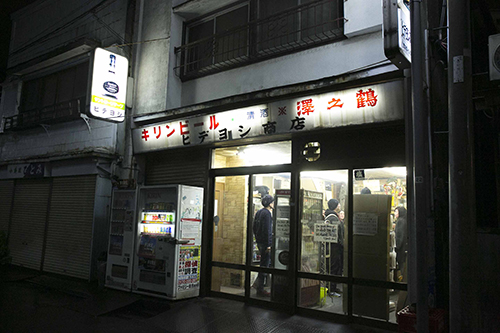
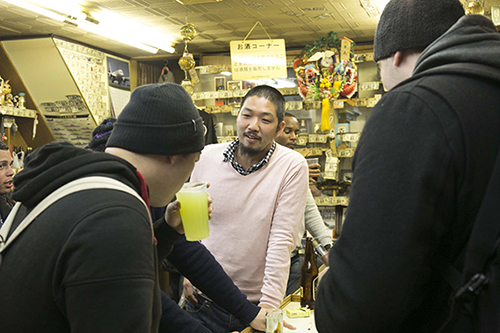
The store is lively.
Another theme is magic...
Fujiwara: I feel like we've talked quite a bit about language, but we haven't really talked about magical-like magic... I've had quite a bit of pufferfish sake going around already... but pufferfish sake starts to take effect at 2 in the afternoon... what time is it now?
Fujii: But language itself is kind of like magic. In the end, you don't understand anything about language. That's why it's so magical.
The sound of the shutters closing could be heard. Before I knew it, it was 10pm, closing time. Customers were starting to leave one by one. "Thank you very much! Thank you.
The smiling store manager said "Bye!" as we saw each other off and each of us dispersed into the night in Yokosuka.
Language and magic are endless topics that can be discussed once we start, but now that we've reached a certain punchline, we start packing to go home...
Finally, we took a commemorative photo with the two remaining customers!
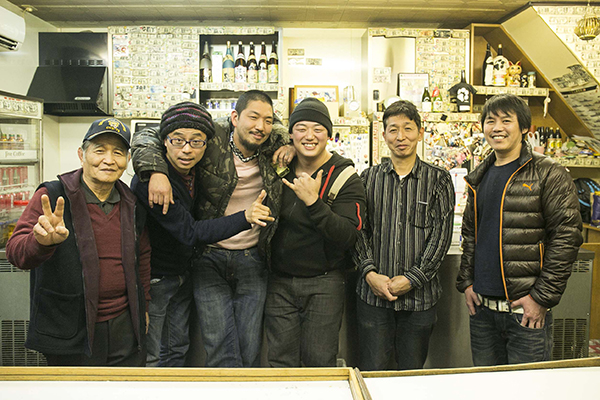
Here are the snacks I had today
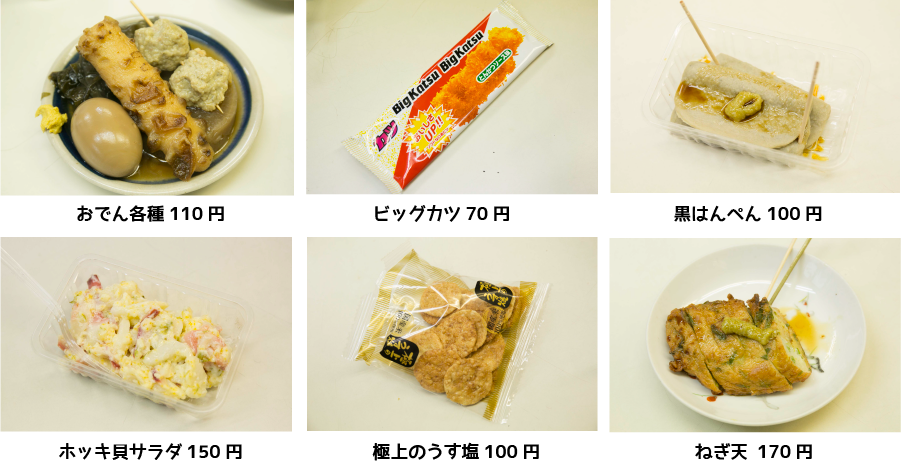
And today's recommendation is...
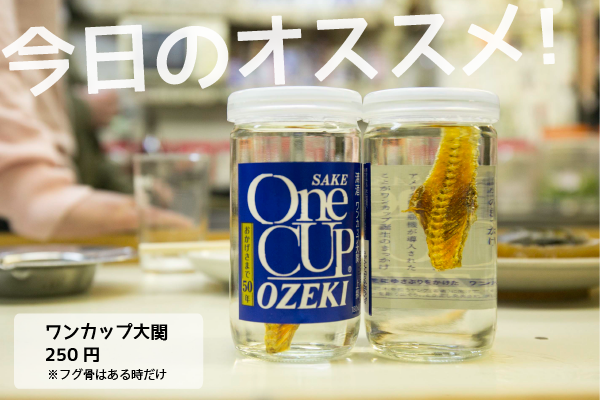
*The menu will change depending on the situation on the day.
《Store Information》
Hideyoshi Shoten
2-45 Shioiricho, Yokosuka City, Kanagawa Prefecture
TEL: 046-825-0550
Business hours: Monday to Saturday 9:00 to 22:00
Closed: Sunday
Access: 84m from Shioiri Station on the Keihin Kyuko Line
Click here for details

The Engeki Quest Yokohama Twilight Edition, designed and edited by Chikara Fujiwara, will be held from February 9th to February 15th.
<This event has ended.>
